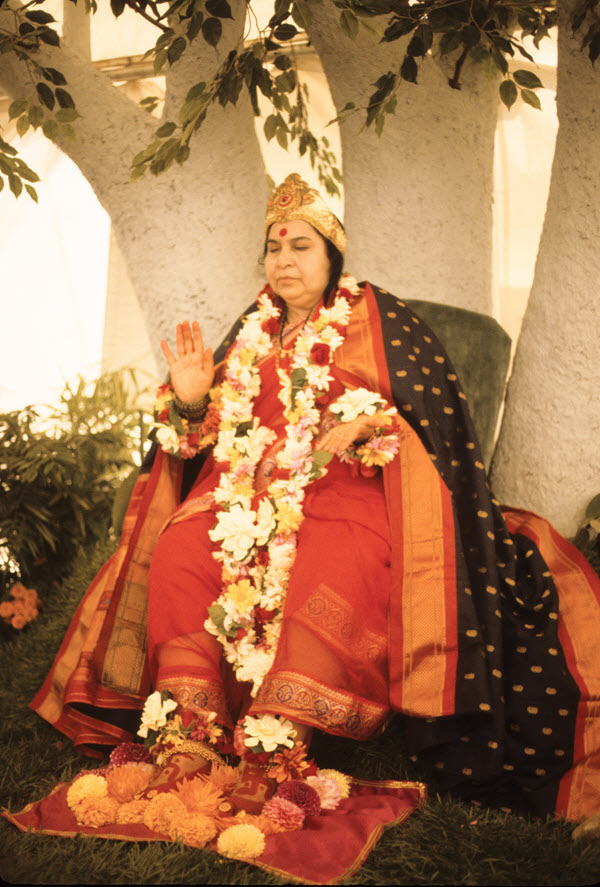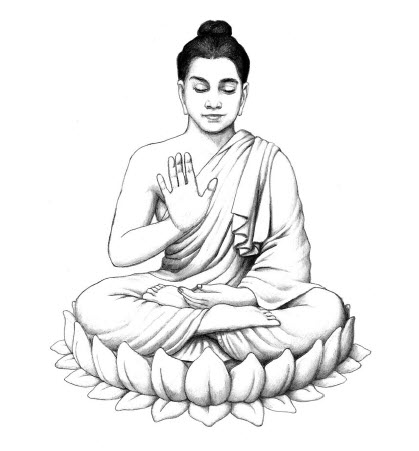Dear Family,

“I am not doing it. It’s Mother who is doing it”
“So Buddha’s message is, of course, is not to develop ego. But how do you do that? First of all, whatever you are doing you have to say, “I am not doing it. It’s Mother who is doing it” or “God who is doing it, I am not doing anything.” But if you feel that you are doing something for Sahaja Yoga, it’s better you stop doing it. But you should say, “No, it came my way. I just … I didn’t do anything. I was just there. That’s all.” Then you have achieved a great deal. And the second thing is of desire, even desire of anything, of smallest thing or the biggest thing or even loving your children, loving you wife, this “my, mine” all those things; all these desires, if they are not fulfilled you feel frustrated, then you must know that there’s something wrong with you. But, if you understand the sense of collectivity, then you can ascend very fast. …
… As you know that Buddha and Mahavira both support the center of Agnya. So if you have to have a very clear-cut Agnya chakra then on one side you should be desireless, you should forgive, “kshum.” Kshum is the bija mantra, is to forgive; bija mantra of right side. Kshum, I forgive.
And the left side is “hum.” Like the left sided person always feels, “Oh, I’m no good.” This he has to say, “No, I’m good.” “Hum,” “I am.” So hum and kshum: these are two bija mantras, which we have to say. Of course, if you say they will act because, after all, now your pranas have become pranavas, your breath has become enlightened, but rather weak I should say, but doesn’t matter.
Your mantras can act. You must use these two bija mantras to clear out your Agnyas. But Mahavira has a solution for this that after realization if you catch your Agnya, you get a terrible headache. That’s Mahavira’s style. You do anything wrong, you get punishment; you indulge into anything, you are punished; you go against Sahaja Yoga, you are punished. I’m not doing anything, it’s Mahavira, simultaneously working. If you try to be overly smart, you are outsmarted. …”
HH Shri Mataji Nirmala Devi, Shri Buddha Puja, Deinze, Belgium, 4 August 1991
“But there are four things which Buddha has said very nicely, which all of you should say every morning”
“And this is what we have to see, that we have to accept what we are, and we are the spirit. If we are the spirit, then we have to live and enjoy and do whatever is necessary. But there are four things which Buddha has said very nicely, which all of you should say every morning, I think, to understand. So first He says, “Buddham sharanam gacchami” – “I surrender myself to Buddha”: means “I surrender myself to my awakened attention, to my awakened consciousness. Buddham sharanam gacchami.” Is very important to know that He said it again and again.
Then He said, “Dhammam sharanam gacchami.” That is, “I surrender myself to my dharma.” Dharma is not what is outside – these religions which are mythical and which are gone into some sort of a perversions – but the religion within myself, the innate religion. I surrender myself to that: which is righteousness, which you know very well what are the real things within us, which gives us all the value system.
Then the third thing He has said, “Sangham sharanam gacchami.” “I surrender myself to collective.” You have to meet. I’m trying My level best to get some place where you can all meet, even in the name of a picnic or anything, at least once a month. “Sangham sharanam gacchami” is very important, because then you’ll know that you are part and parcel of the whole; that a microcosm has become the macrocosm; that you are a part and parcel of the Virat – that you become aware of it. And that is how things work out very fast, that is how we help each other. That is how we discover a person who is negative, that’s how we discover who is not. We discover a person who is egoist, who is not egoist. That’s how we discover the people who are not at all Sahaja yogis, claim themselves to be Sahaja yogis, and we just give them up, we understand.
Without coming to the collective, without being collective, you can never understand the value of collectivity. It is so great. It gives you so many powers, it gives you so much satisfaction and joy that one must in Sahaja Yoga first pay attention to collectivity. Even supposing there’s something missing, doesn’t matter; you just become collective. While coming to collective you don’t have to criticise others, you don’t have to call names of others, you don’t find faults with them. But you introspect yourself and know that “Why, when everybody is enjoying themselves, why am I the one sitting down and trying to find faults? Must be something wrong with me.”
If you can just pay attention to yourself as far as the defects are concerned, then I am sure you will become much more collective than when you start seeing the defects in other people. And no use, I mean no use seeing. Supposing I have a spot on My sari, I better clean it. But if you have a spot on your sari, what’s the use of looking at it? I cannot clean it; you have to do it yourself. Is a simple thing, it’s a very practical thing, and this kind of a practical … (Can you hear Me, all of you?) It’s such a practical thing has to be done to understand that Sahaja Yoga is the most practical, is the most practical, because it is absolute reality.
So with all these powers, with all these understandings, with all this compassionate love, you have to be sure about yourself, and know that you are all the time protected, guided, looked after, nourished, and helped to grow by this divine Power, which is all-pervading.
May God bless you all.”
HH Shri Mataji Nirmala Devi, Shri Buddha Puja, Shudy Camps, England, 31 May 1992

O Divine Mother, You are verily Shri Buddha. Salutations to You!
Andre and Lyn on behalf of your Australian Councillors


